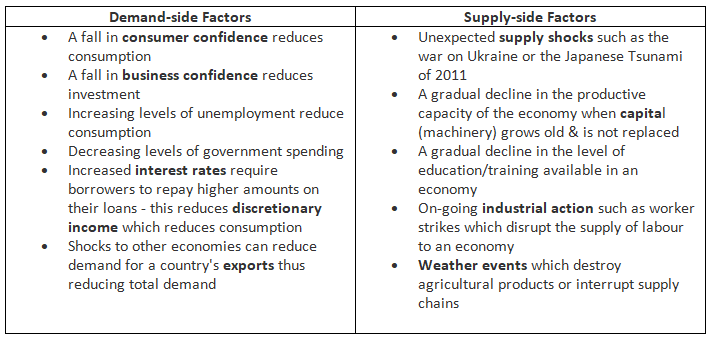Year 11 Exam > Year 11 Notes > Economics for GCSE/IGCSE > Causes & Consequences of Recessions
Causes & Consequences of Recessions | Economics for GCSE/IGCSE - Year 11 PDF Download
Causes of Recessions
- A recession denotes a period lasting at least six months, equivalent to two quarters, characterized by economic contraction, leading to a decline in real Gross Domestic Product (rGDP).
- Causes of recession may include a decrease in any of the factors influencing total demand, such as consumption, investment, government spending, or net exports. For instance, the Covid-19 lockdowns led to a decline in consumption, precipitating recessions in numerous economies.
- Additionally, recessions can result from supply-side shocks that pose challenges for both firms and consumers. For example, the Russian conflict with Ukraine has diminished the supply of natural gas, oil, and petrol, causing significant disruptions and escalating energy costs.
Factors That Reduce Total Demand & Total Supply

- Supply-side disruptions causing economic decline, or recession, can be depicted through a production possibility curve (PPC).

Diagram Explanation:
- Economic decline ensues when any factor impairs the quantity or quality of available factors of production, as indicated by movement A.
- An illustration of this phenomenon is the Japanese tsunami of 2011, which severely disrupted Japan's production possibilities for an extended period, inwardly shifting their PPC and precipitating economic decline.
Consequences of Economic Recessions
The outcomes of an economic recession vary depending on its severity and duration. For instance, the Great Depression spanned from 1929 to 1939, contrasting with shorter recessions that last only a year.
- National output, as measured by real GDP (rGDP), experiences a decline during recessions.
- Business closures increase during recessions, as more firms face financial insolvency.
- Unemployment rates rise, accompanied by a surge in underemployment, where individuals work in positions below their skill levels.
- Both exports and imports diminish as economic activity contracts.
- Investment, both domestic and foreign, decreases or halts as businesses become more risk-averse during economic downturns.
- Deflation, a general decline in prices, can emerge as a concern during recessions, leading to further reductions in wage levels.
- Government spending on unemployment benefits escalates to support individuals out of work.
- Entry opportunities for new job market participants decrease, leading to heightened youth unemployment rates.
- Governments may need to allocate substantial funds to bolster the economy, incurring significant opportunity costs in the process.
Question for Causes & Consequences of RecessionsTry yourself: What can cause a recession?View Solution
The document Causes & Consequences of Recessions | Economics for GCSE/IGCSE - Year 11 is a part of the Year 11 Course Economics for GCSE/IGCSE.
All you need of Year 11 at this link: Year 11
|
71 videos|82 docs|39 tests
|
FAQs on Causes & Consequences of Recessions - Economics for GCSE/IGCSE - Year 11
| 1. What are some common causes of economic recessions? |  |
Ans. Some common causes of economic recessions include financial crises, high levels of debt, economic imbalances, and external shocks such as natural disasters or geopolitical events.
| 2. What are some consequences of economic recessions? |  |
Ans. Consequences of economic recessions may include job losses, decreased consumer spending, lower GDP growth, reduced business investment, and increased government deficits.
| 3. How do financial crises contribute to causing recessions? |  |
Ans. Financial crises can contribute to causing recessions by leading to a tightening of credit, a decrease in consumer and business confidence, a decline in asset prices, and disruptions in the financial system.
| 4. How can high levels of debt trigger an economic recession? |  |
Ans. High levels of debt can trigger an economic recession by making it difficult for individuals, businesses, and governments to repay their debts, leading to a decrease in spending, investment, and economic activity.
| 5. How do external shocks like natural disasters impact the economy and lead to a recession? |  |
Ans. External shocks like natural disasters can impact the economy by causing damage to infrastructure, disrupting supply chains, increasing costs, and reducing economic output, which can lead to a recession.

|
Explore Courses for Year 11 exam
|

|
Signup for Free!
Signup to see your scores go up within 7 days! Learn & Practice with 1000+ FREE Notes, Videos & Tests.
Related Searches
















